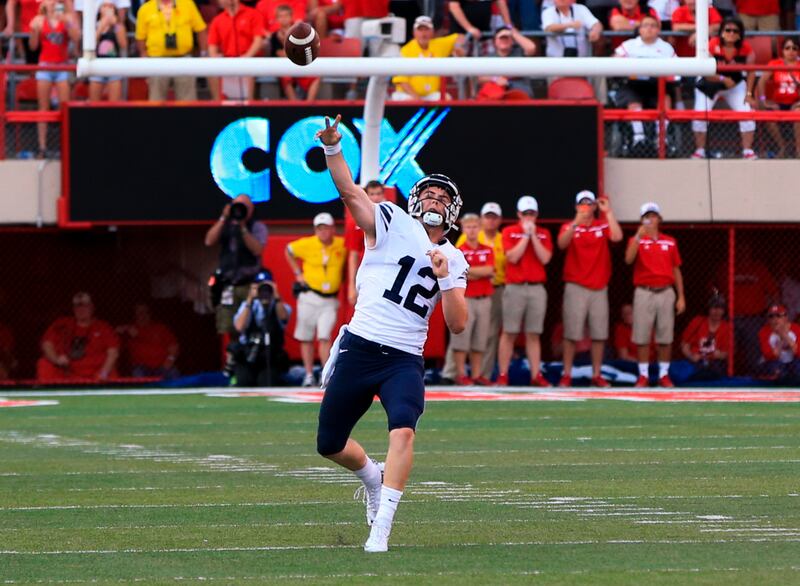A college football rule change approved Friday may not seem like a big deal on the surface, but had it come earlier, it could have greatly altered BYU’s illustrious football past.
The playing rules oversight committee voted to allow the clock to continue running after first downs (like the NFL). It believes it will eliminate, on average, seven plays from each game.
The final seven plays of a game have meant a lot to BYU. Just imagine if they weren’t around when the Cougars needed them.
To wit ...
BYU 18, No. 14 Texas A&M 17: Marc Wilson’s touchdown pass to Clay Brown and his two-point conversion toss to Mike Lacey with 52 seconds remaining to stun the Aggies in 1979 would have never happened.
No. 14 BYU 46, No. 19 SMU 45: Jim McMahon’s 41-yard touchdown to Clay Brown on the final play from scrimmage and Kurt Gunther’s ensuing extra point to beat SMU 46-45 in the 1980 Holiday Bowl would have never happened.
No. 7 BYU 21, Missouri 17: Steve Young’s scoring drive and touchdown catch with 23 seconds left to beat Missouri 21-17 in the 1983 Holiday Bowl would have never happened.
No. 1 BYU 24, Michigan 17: Robbie Bosco’s touchdown pass to Kelly Smith with 1:23 remaining to beat Michigan 24-17 in the 1984 Holiday Bowl to give the Cougars the national championship would have never happened. Without the final seven plays, the game would have ended in a tie.
BYU 34, Utah 27: Brandon Doman’s scoring drive, touchdown run and two-point conversion with 23 seconds left to beat Utah 34-27 at Rice-Eccles Stadium to give LaVell Edwards his 257th and final career victory would have never happened.
No. 21 BYU 33, Utah 31: John Beck’s scoring drive and touchdown pass to Johnny Harline on the final play of the game to defeat Utah 33-31 in Salt Lake City in 2006 would have never happened.
BYU 34, Nebraska 28: Tanner Mangum’s 42-yard touchdown pass to Mitch Mathews as time expired to beat Nebraska 33-28 in Lincoln in 2015 would have never happened.
BYU 18, Arizona 16: Taysom Hill’s scoring drive and Jake Oldroyd’s 33-yard field goal on the final play of the game to give Kalani Sitake an 18-16 win in his 2016 BYU coaching debut would have never happened.
BYU 29, Tennessee 26 (20T): Zach Wilson’s 64-yard pass to Micah Simon to set up Oldroyd’s 33-yard field goal as time expired to force overtime at Tennessee in 2019 would have never happened. BYU went on to beat the Vols 29-26 in double overtime.
BYU 31, Boise State 29: Jaren Hall’s throw and Puka Nacua’s circus catch in the end zone with 1:46 to play to beat Boise State 31-29 in 2022 wouldn’t have happened. Nacua’s heroics came on the game’s seventh-to-last play from scrimmage.
There are many more instances where the final seven plays of a game have impacted BYU’s successes and failures. The rules committee believes fewer plays will enhance player safety and reduce the length of the game.
They may be right. The future is on speed dial. Almost every sport is trying to figure out how to shorten the length of competition. Baseball is using pitch clocks this year. Time was even an issue at the Masters, where slow play became a point of discussion.
Looking further ahead, the rules committee might want to take a look at those 3:50 commercial breaks that can turn a third quarter into an eternity, even as players and fans fight off hypothermia in the stadium.
For now, they are committed to trimming seven plays by allowing the clock to run after first downs, except for the last two minutes of each half. The change will be noticeable when BYU kicks off against Sam Houston on Sept. 2.
History will be the judge on how the new rule will impact college football, just as history has shaped BYU’s football program in so many ways — and often by the last seven plays of the game.

Dave McCann is a contributor to the Deseret News and is the studio host for “BYU Sports Nation Game Day,” “The Post Game Show,” “After Further Review,” and play-by-play announcer for BYUtv. He is also co-host of “Y’s Guys” at ysguys.com.


